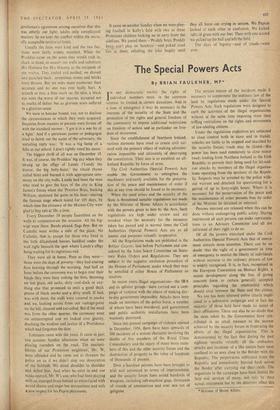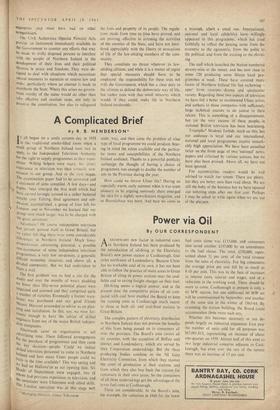The Special Powers Acts
By BRIAN FA ULKNER, MP* 'individual any democratic society the rights of 'individual members must, in the common interest, be limited in certain directions. And in a time of emergency it may be necessary in the interests of the security of the State and the protection of the rights and general freedom of the community to impose additional restrictions on freedom of action and in particular on free- dom of movement.
Since the establishment of Northern Ireland, various elements have tried to create civil tur- moil with the primary object of making administ- ration impossible and ultimately of destroying the constitution. Their aim is to establish an all- Ireland Republic by force of arms.
The Civil Authorities (Special Powers) Acts enable the Government to strengthen the machinery ordinarily available for the preserva- tion of the peace and maintenance of order if this at any time should be found to be necessary.
When the need arises and the security of the State is threatened suitable regulations are made by the Minister of Home Affairs in accordance with the powers given to him by the Acts. Such regulations are kept under review and are revoked when the necessity for the measures taken has passed and in normal times the Civil Authorities (Special Powers) Acts are to all intents and purposes virtually inoperative.
All the Regulations made are published in the Belfast Gazette, laid before Parliament and con- sidered by the Joint Select Committee on Statu- tory Rules Orders and Regulations. They are subject to the negative resolution procedure of the Houses of Parliament, :under which they may be annulled if either House of Parliament so resolves.
In recent years illegal organisations—the IRA and its splinter groups—have carried out a cam- paign of violence with the object of making day- to-day government impossible. Attacks have been made on members of the police force, a number of whom have been murdered, and government and public authority installations have been wantonly destroyed.
Since this present campaign of violence opened in December, 1956, there have been upwards of 300 incidents of a serious character involving the deaths of five members of the Royal Ulster Constabulary and the injury of many more mem- bers of this and the other security forces and the destruction of property to the value of hundreds of thousands of pounds.
Over a hundred persons have been brought to trial and sentenced to terms of imprisonment, and the security forces have seized hundreds of weapons, including sub-machine guys, thousands of rounds of ammunition and over one ton of gelignite. The serious nature of the incidents made it necessary to supplement the ordinary law of the land by regulations made under the Special Powers Acts. Such regulations were designed to curb the activities of the illegal organisations without at the same time imposing more than trifling restrictions on the rights and movements of law-abiding citizens.
Under the regulations explosives are subjected to close control both in store and in transit; vehicles are liable to be stopped and searched by the security forces; roads may be closed—this power has been used extensively to close minor roads leading from Northern Ireland to the Irish Republic to prevent their being used for hit-and- run attacks by members of the illegal organisa- tions operating from the territory of the Repub- lic. Suspects may be arrested by the police with- out warrant and detained for questioning for a period of up to forty-eight hours. Where it is necessary for the preservation of the peace and the maintenance of order persons may by order of the Minister be detained or interned.
Persons interned are released when this can be done without endangering public safety. During internment all such persons can make representa- tions to an Advisory Committee and all are informed of their right to do so.
Of all the powers exercised under the Civil Authorities (Special Powers) Acts that of intern- ment attracts most attention. There can be no doubt that the right of a government in time of emergency to restrict the liberty of individuals without recourse to the ordinary process of law is widely recognised. It is, in fact, recognised in. the European Convention on Human Rights, a recent development along the line of giving concrete form to certain generally accepted principles regarding the relationship which should exist between the State and the citizen.
No one has been interned unless clearly impli- cated in a subversive campaign and in fact the majority of those held have made no secret of their affiliations. There can also be no doubt that the steps taken by the Government have con- tributed in no small measure to the success achieved by the security forces in frustrating the efforts of the illegal organisations. This is demonstrated by the fact that during the past eighteen months virtually all the ambushes, attacks and incidents of a like nature have been confined to an area close to the Border with the Republic. The perpetrators infiltrated from the Republic and immediately hurried back across the Border after carrying out their raids. The organisers in the campaign have been denied the help and services of many, not only by their actual internment but by the deterrent effect this * Minister of Home Affairs.
unpopulat step must have had on other sympathisers.
The Civil Authorities (Special Powers) Acts Provide an instrument immediately available to the Government to counter any.efforts that may be made by evilly disposed persons to interfere with the people of Northern Ireland in the development of their .lives and their political theories in peace and freedom. They were .de- signed to deal with situations which necessitate special measures to maintain or restore law and orde.., particularly where an attempt is made to overthrow the State. Where this arises no govern- ment worthy of the name would do other than take effective and resolute steps, not only to Preserve the 'constitution, but also to safeguard
the lives and property of its people. The regula- tions made from time to time have proved, and are proving, effective in arresting the activities of the enemies of the State, and have not inter- fered appreciably with the liberty or avocations of life of the law-abiding members of the com- munity.
They constitute no threat whatever to law- abiding citizens, and while it is a matter of regret that special measures should have to be employed. the responsibility for these rests not %.;111 the Government, which has a clear duty to the citizens to defend the democratic way of life, but rather, rests with that small minority which would. if they could. make life in Northern Ireland intolerable.















































 Previous page
Previous page